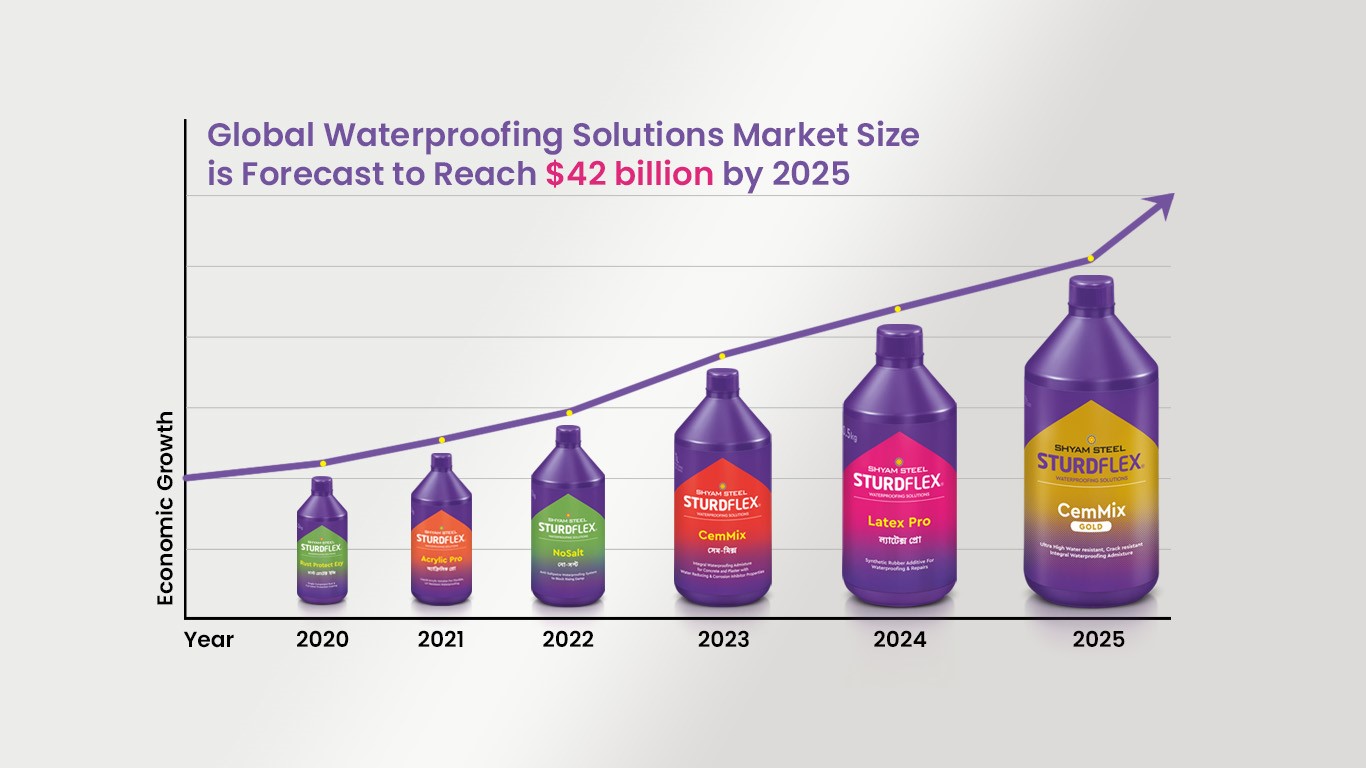
Impact of Waterproofing Solutions on the Construction Economy
Waterproofing is a crucial aspect of any construction project, ensuring the long-term durability and structural integrity of buildings. With the rapid growth of urbanization and the increasing number of construction projects, the impact of waterproofing solutions on the construction economy has become a topic of great significance. The present Waterproofing Solutions Market size is forecast to reach $42 billion by 2025, after growing at a CAGR of 7.2% during 2020-2025, owning to increasing government investments in infrastructure developments in the Asia Pacific, particularly in India, China, and Indonesia and increasing usage of waterproofing solutions in the mining industry. In addition, increasing waste & water management activities in these countries have also triggered the demand for waterproofing globally. Waterproofing solutions ensure longer durability of the structure, hence reducing maintenance costs. Water damage can lead to corrosion of metals, electrical hazards, rotting of timber structures and finishes, plasterboard swelling, and growth of fungus which may lead to health hazards. Therefore, in order to reduce these risks waterproofing usage is increasing.
Owing to this market scenario this article explores the various ways in which waterproofing solutions affect the construction economy, both in terms of costs and benefits.
Enhancing Longevity and Reducing Maintenance Costs
Waterproofing solutions play a vital role in protecting buildings from water damage, which is one of the leading causes of structural deterioration. By preventing water intrusion, these solutions help extend the lifespan of structures, reducing the need for frequent repairs and maintenance. This directly impacts the construction economy by lowering long-term costs for building owners, as they can avoid expensive repairs and replacement of damaged materials.
Preventing Losses due to Water Damage
Water damage can have severe consequences, leading to significant financial losses for both builders and building owners. Waterproofing solutions act as a proactive measure to prevent water-related issues such as leakage, mold growth, and deterioration of building components. By eliminating or minimizing water damage risks, these solutions protect investments, reducing the likelihood of financial losses for stakeholders in the construction industry.
Increased Demand for Waterproofing Products and Services
The growing awareness of the importance of waterproofing has resulted in increased demand for related products and services. This trend has stimulated the growth of the waterproofing industry, leading to the emergence of new businesses and employment opportunities. Manufacturers of waterproofing materials, contractors specializing in waterproofing installations, and professional consultants have witnessed a surge in demand, contributing to the overall growth of the construction economy.
Improved Energy Efficiency
Waterproofing solutions not only protect against water damage but also contribute to improved energy efficiency in buildings. By preventing water ingress, these solutions help maintain the integrity of insulation materials, reducing heat transfer and energy losses. Properly insulated buildings require less energy for heating and cooling, leading to reduced utility bills for occupants. Consequently, the construction economy benefits from increased demand for energy-efficient building designs and materials, driving innovation and technological advancements.
Compliance with Building Regulations and Standards
In many regions, building codes and regulations require the implementation of waterproofing measures to ensure the safety and habitability of structures. Adhering to these regulations is essential for obtaining necessary permits and certifications. Waterproofing solutions that meet or exceed the standards set by regulatory bodies help builders comply with these requirements. Failure to comply may result in costly delays or even penalties, impacting the construction economy negatively.
Preservation of Property Value
Water damage can significantly decrease the value of a property. Buildings with a history of water-related issues may face challenges during resale or rental, affecting their marketability and value. By providing effective waterproofing solutions during construction, developers can protect property values over the long term. This preservation of value is beneficial for the construction economy as it maintains the overall worth of the built environment.
Boosting Reputation and Attracting Investment
The use of high-quality waterproofing solutions in construction projects enhances the reputation and credibility of builders, contractors, and developers. Consistently delivering structures with excellent waterproofing systems establishes trust among clients and investors. A solid reputation can attract more business opportunities, partnerships, and investment in future projects, positively impacting the construction economy.
Denouement
Construction is a high-risk industry that includes a wide range of activities, from infrastructure development to renovation that includes residential construction, bridge construction, road paving, and large-scale re-roofing jobs. The increase in these construction activities is creating additional demand in emerging economies such as China, India, and Japan for waterproofing solutions. Since the building & construction industry is stagnant in developed regions, waterproofing solutions are mostly required in these regions for applications related to repairs. However, the demand for waterproofing solutions is increasing in developing regions, with modern construction projects coming in. As a result, the large-scale impact of waterproofing solutions on the construction economy is multi-faceted and far-reaching. From reducing maintenance costs and preventing financial losses to promoting energy efficiency and compliance with regulations, the benefits are significant. Additionally, the growing demand for waterproofing products and services creates new business opportunities and employment prospects. By recognizing the importance of waterproofing and investing in high-quality solutions, the construction industry can build durable, sustainable, and economically viable structures for the future.
